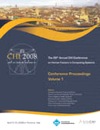CHI 2008: a selection on emerging markets
(Papers are linked to their pdf downloads, if available)
Re-placing faith: reconsidering the secular-religious use divide in the United States and Kenya [abstract]
Authors: Susan P. Wyche (Georgia Institute of Technology), Paul M. Aoki (Intel Research) and Rebecca E. Grinter (Georgia Institute of Technology)
Abstract: In this paper, we report on design-oriented fieldwork and design research conducted over a six-month period in urban centers in the United States and Kenya. The contributions of this work for the CHI/CSCW community are empirical and methodological. First, we describe how recent design discourse around “designing technology for religion” creates an artificial distinction between instrumental and religious ICT use, particularly in developing regions. As illustrative examples, we relate three themes developed in the course of our fieldwork, which we term mindfulness, watchfulness, and embeddedness, to both “secular” and “religious” aspects of life in the communities studied. Second, we make a methodological contribution by describing how we used design sketches of speculative design concepts to extend and complement our fieldwork. By producing these sketches and soliciting feedback, we elicited additional data about how participants viewed the relationship between religion and ICT and prompted self-reflection on our own ideas.
Asynchronous remote medical consultation for Ghana [abstract]
Authors: Rowena Luk (Intel Research), Melissa Ho (UC Berkeley), Paul M. Aoki (Intel Research)
Abstract: Computer-mediated communication systems can be used to bridge the gap between doctors in underserved regions with local shortages of medical expertise and medical specialists worldwide. To this end, we describe the design of a prototype remote consultation system intended to provide the social, institutional and infrastructural context for sustained, self-organizing growth of a globally-distributed Ghanaian medical community. The design is grounded in an iterative design process that included two rounds of extended design fieldwork throughout Ghana and draws on three key design principles (social networks as a framework on which to build incentives within a self-organizing network; optional and incremental integration with existing referral mechanisms; and a weakly-connected, distributed architecture that allows for a highly interactive, responsive system despite failures in connectivity). We discuss initial experiences from an ongoing trial deployment in southern Ghana.
A resource kit for participatory socio-technical design in rural Kenya [abstract]
Authors: Kevin Walker (London Knowledge Lab), Joshua Underwood (London Knowledge Lab), Tim Mwolo Waema (University of Nairobi), Lynne Dunckley (Institute for Information Technology, Thames Valley University), José Abdelnour-Nocera (Institute for Information Technology, Thames Valley University), Rosemary Luckin (London Knowledge Lab), Cecilia Oyugi (Institute for Information Technology, Thames Valley University) and Souleymane Camara (Institute for Information Technology, Thames Valley University)
Abstract: We describe our approach and initial results in the participatory design of technology relevant to local rural livelihoods. Our approach to design and usability proceeds from research in theory and practice of cross-cultural implementations, but the novelty is in beginning not with particular technologies but from community needs, and structuring technology in terms of activities. We describe our project aims and initial data collected, which show that while villagers have no clear mental models for using computers or the Internet, they show a desire to have and use them. We then describe our approach to interaction design, our expectations and next steps as the technology and activities are first introduced to the villages.





[…] papers out of a total of 556, that I will be presenting in ten separate posts, under the headings: emerging markets, mobile banking, mobility, product design, security, social applications, social context, strategic […]
[…] e ho selezionato 40 paper su un totale di 556, che presenterò in dieci post separati, coi titoli: mercati emergenti, mobile banking, mobilità , product design, sicurezza, applicazioni sociali, contesto sociale, […]